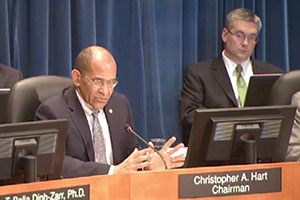NTSB Rips FMCSA on Crash

The Federal Motor Carrier Safety Administration was publicly criticized by the National Transportation Safety Board for “inadequate safety oversight of high-risk carriers” after an investigation of a fatal crash in Illinois in which fatigue was blamed.
NTSB said Feb. 9 that a driver for DND International Inc. struck emergency vehicles stopped in the right lane of Interstate 88 near Naperville, Illinois, and assisting a disabled tractor-trailer operated by another motor carrier, Michael’s Cartage.
“The probable cause of a fatal January 2014 crash near Naperville, Illinois, was a truck driver’s delayed reaction caused by fatigue and the poor safety behavior of a high-risk motor carrier,” NTSB said.
One person died and two people, including an Illinois State Police officer, were seriously injured.
It also said that DND International’s failure to ensure that its driver adhered to federal hours-of-service regulations contributed to the crash.
Under FMCSA’s rule on HOS, drivers can be behind the wheel for no more than 11 hours and on the job for no more than 14 hours during a 24-hour period.
NTSB investigators said the DND International driver had slept less than 4½ of the 37 hours preceding the crash.
“Fatigued driving kills,” NTSB Chairman Christopher Hart said, “and motor carriers that do not ensure that their drivers follow regulations designed to prevent fatigued driving are unsafe and should not be able to continue operating.
“DND enabled this behavior,” Hart added. “The driver was falsifying his logbooks, and DND was not overseeing the books.”
Also contributing “was the federal regulator’s inadequate safety oversight of high-risk carriers,” NTSB charged, adding that DND International and Michael’s Cartage had long-standing records of poor safety behavior and were categorized as high-risk carriers by FMCSA.
“Yet for years, due to lack of resources and unsuccessful regulatory action, the FMCSA was unable to get the carriers to improve their safety behaviors in a meaningful way or to stop them from operating,” NTSB said.
The DND International driver had falsified his logs 36.9% of the time during the six months ending with the crash. The Michael’s Cartage driver had a 54.4% falsification rate during the same period and had an invalid commercial driver license. His truck had unsafe brakes, tires and lights, the investigation found.
NTSB said that FMCSA, even with the help of state investigators, was able to perform compliance reviews of only 2.8% of more than 10.6 million trucks operated by the nation’s 539,000-plus carriers in fiscal 2014.
Among NTSB’s recommendations to FMCSA is that it use its authority to suspend the operations of a carrier with at least five intervention alerts in its Behavior Analysis and Safety Improvement Categories under FMCSA’s Compliance, Safety, Accountability program.
NTSB added that FMCSA “is making progress in improving its oversight,” thanks to proposed rules such as electronic logging devices and safety fitness determination.
NTSB member Robert Sumwalt said that ELDs will be “a game-changer.”
FMCSA spokesman Duane DeBruyne said the agency would cooperate fully with NTSB and would work diligently to address the safety recommendations.
According to NTSB’s investigation of the crash, the DND International truck, which was towing a flatbed trailer loaded with steel coils, first struck an Illinois State Police patrol car, pushing it off the road. Flames engulfed the patrol car, seriously injuring the officer.
The truck then crashed into a Highway Emergency Lane Patrol (HELP) truck, sandwiching it between the striking truck and the disabled tractor-trailer and fatally injuring the HELP truck driver. That impact then pushed the disabled tractor-trailer into a heavy-duty tow truck.
“Despite several clearly visible warning indicators on the roadway, the driver of the DND International truck did not slow down or steer to avoid the stopped vehicles, and applied the brakes just one second before impact,” NTSB found.
The agency last month unveiled its Most Wanted List of safety improvements, and fatigue was at the top.
“Combating fatigue requires a comprehensive approach focused on research, education and training, technologies, treatment of sleep disorders, hours-of-service regulations, and on- and off-duty scheduling policies and practices.”
DND since has ceased operations because it declined to pay its costly post-crash insurance premiums, an NTSB official said during a hearing Feb. 9.
Michael’s Cartage remains in business but couldn’t be reached for comment.

